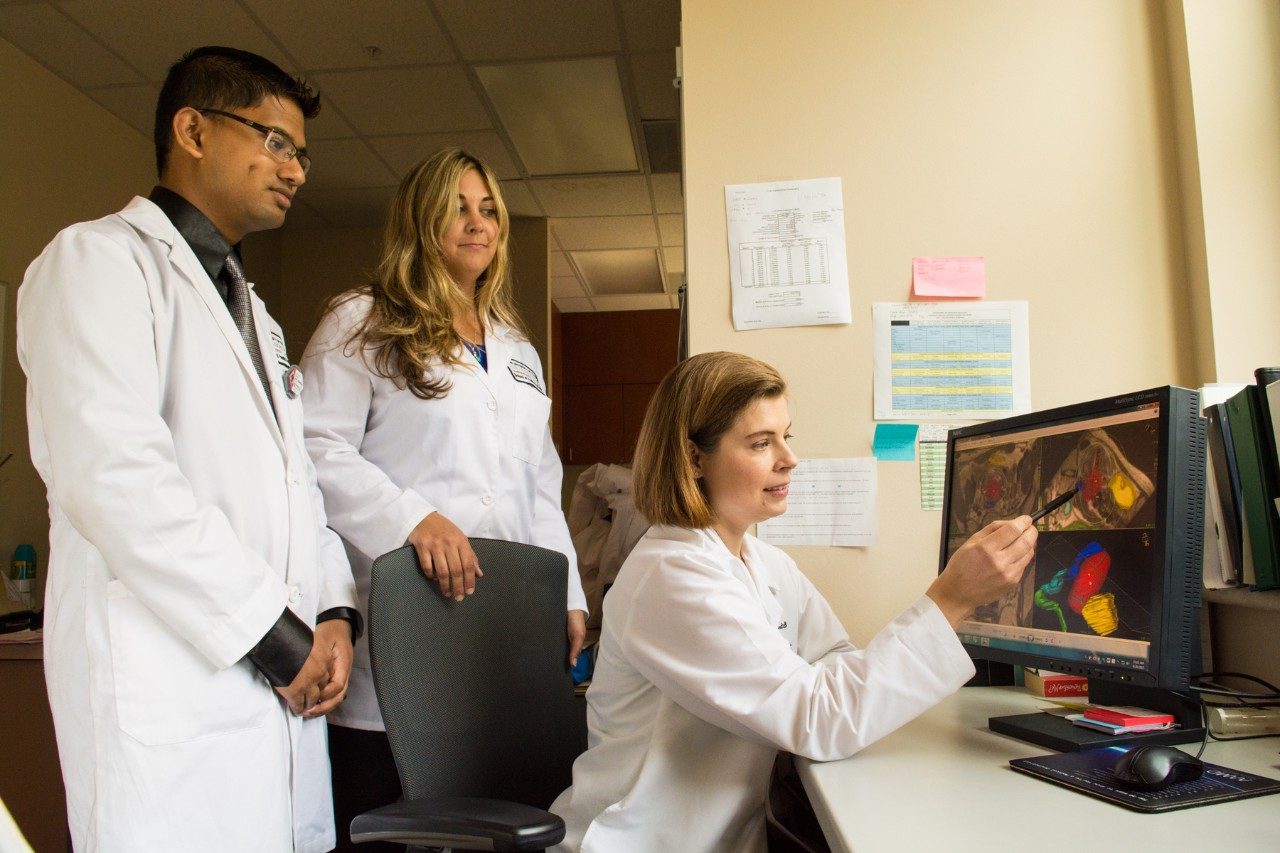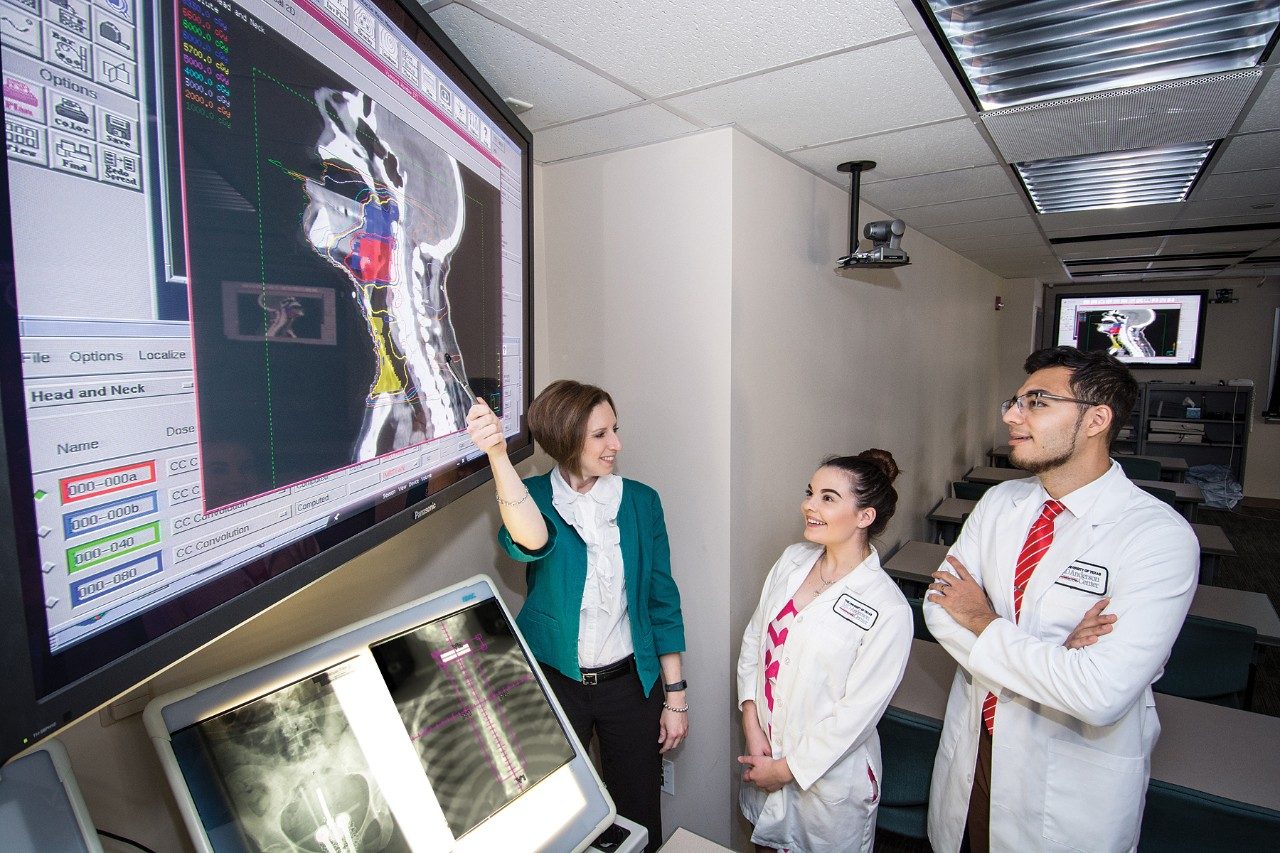Medical Dosimetry
in the School of Health Professions
Log in to our secure, personalized website to manage your care (formerly myMDAnderson).
If you are ready to make an appointment, select a button on the right. If you have questions about MD Anderson’s appointment process, our information page may be the best place to start.
Appointment Informationin the School of Health Professions
Medical Dosimetrists are vital members of the radiation oncology team, working closely with radiation oncologists, medical physicists and radiation therapists to create customized radiation treatment plans designed to target cancer while sparing normal tissue. Students acquire the professional skills of dose calculation, treatment design and quality assurance through intensive education in a classroom, laboratory and clinical setting.
View the 2025 Medical Dosimetry Virtual Brochure (pdf)
The program offers a two-year track with two educational delivery options leading to the Bachelor of Science degree. See the prerequisites and FAQs (pdf).
View the M.S. in Medical Dosimetry page.




Program Director
Mahsa Dehghanpour, Ed.D.
Associate Program Director
Jamie Baker, Ph.D.
Executive Advisor
George Perkins, M.D.
PRS Medical Staff Governance
Professor, Department of Radiation Oncology
Division of Radiation Oncology
MD Anderson Cancer Center
The Medical Dosimetry program is accredited by the Joint Review Committee on Education in Radiologic Technology (JRCERT). The program's current award is accreditation for a period of 8 years. General program accreditation information and the current accreditation award letter can be found on the JRCERT web page.
JRCERT
20 N. Wacker Dr., Ste 2850
Chicago, IL 60606-3182
Phone 312-704-5300
Email mail@jrcert.org
Upon completion of the program, students will qualify for examination and certification from the Medical Dosimetrist Certification Board (MDCB).
To provide high quality of didactic and technologically advanced clinical education in Medical Dosimetry and to graduate professional practitioners who are valued by radiation oncology employers, display excellent treatment planning and assessment skills, and remain active in the professional community and learning throughout their careers.
We shall be the premier educational program in medical dosimetry by providing innovative curricular, clinical and continuing education services to the University of Texas MD Anderson Cancer Center, the State of Texas and the world.
Goal 1. Students will be clinically competent.
Student Learning Outcomes
1. Students will produce treatable plans.
2. Students will demonstrate understanding of basic science concepts required for site specific treatment planning.
Goal 2. Students will display critical thinking skills.
Student Learning Outcomes
1. Students will correct radiation errors.
2. Students will adequately respond to challenges about the optimal nature of their treatment plans.
3. Students will show the ability to perform multiple tasks in a timely manner.
Goal 3. Students will demonstrate professionalism.
Student Learning Outcomes
1. Students display professional conduct.
2. Students demonstrate lifelong learning.
3. Students display understanding of their professional codes of ethics.
4. Students will understand school and workplace community competency.
Goal 4. Students will display effective communication skills.
Student Learning Outcomes
1. Students will demonstrate written communication skills.
2. Students will demonstrate oral communication skills.
Goal 5. The program will provide the community with entry level medical dosimetrists.
Student Learning Outcomes
1. Employers will be satisfied with program graduates performance as medical dosimetrists.
2. Graduates will be satisfied with the learning experience provided by the program.
3. The program will produce medical dosimetrists capable of becoming certified.
4. Admitted applicants will complete the program.
5. Program graduates will be employed as Medical Dosimetrists.
6. Students will be satisfied with program courses and instructors.
The Program Director will explain all objectives and assignments to the students at the beginning of each clinical phase. Clinical education is conducted in a lab or clinical setting during the junior year and in a clinical setting during the senior year. Didactic education accompanied clinical education every semester.
During the junior year, students attend two days of treatment planning courses per week in the fall and spring semester. Students are not enrolled in any courses in the summer of their junior year. During the junior year, students enroll in the following treatment planning courses.
During the senior year, students attend clinical education eight hours a day for three days per week. The clinical education is conducted remotely or in a face-to-face format in a clinical setting. Remote or virtual clinical education is utilized in the clinics where the medical dosimetrists work remotely. For example, Houston-based students (assigned to MD Anderson in Houston) and students assigned to Banner MD Anderson in Arizona will have their clinical education in a virtual format. These students are given access to the treatment planning software and database at their assigned clinic and interact with their clinical instructors via Zoom, TEAMS or other platforms. Screen sharing, video conference and other instructional and communication strategies are used to ensure a well-rounded clinical education. Face-to-face clinical observations are scheduled for all students to learn the treatment and simulation aspects of the profession. All students must log the required number of clinical hours per clinical course and complete all clinical requirements successfully to earn the assigned semester credit hours for the course. Clinical education is provided by a series of clinical courses during the senior year. The clinical course schedule will be provided by the program director at the beginning of the school year. Each student should take two of the following courses in the fall, two in the spring and one in summer semester:
All medical dosimetry students are responsible for documenting their clinical participation through the specified time-keeping system, Trajecsys.
The Program Director will assign students to clinical rotations/courses. The schedule will ensure completing the required clinical curriculum for all students enrolled in the program. Any change in the clinical attendance schedule for a student must be directly approved by the Program Director.
Medical Dosimetry program at MD Anderson utilizes MD Anderson clinic in Houston Greater area as well as affiliated clinics. Students are notified of their assigned clinical site, when they are admitted to the program.
The clinical courses will be graded using several sets of criteria that include clinical evaluations of students’ conduct and performance, competency grades, timeliness, presentations, and clinical tasks. Students must complete the courses in order as published in the Medical Dosimetry Curriculum and are required to earn a C grade or higher in every class to progress to the next academic semester.
All students will work under the direct supervision of Medical Dosimetrists when performing direct patient procedure. Direct supervision of the student means that a credentialed practitioner is physically available during the conduct of the procedure, evaluates the condition of the patient in relation to the student’s knowledge, reviews the procedure in relation to the student’s achievement, and reviews and approves the procedure. All medical dosimetry calculations and treatment plans must be approved by a credentialed practitioner prior to implementation.
Under no circumstances is the student allowed to sign work that is included in a patient record or used for patient treatment. Under no circumstances the student is allowed to work unsupervised in the clinical areas.
When a student works on a “real” patient case, the plan constructed by the student cannot be used for treatment unless it is reviewed, approved, and signed by a board-certified medical dosimetrist or a board-certified medical physicist and a board-certified radiation oncologist. The plan should be completely reviewed and approved by a board certified clinical practitioner before being presented to the physician for their approval. Once the plan is approved by the physician, it should be reviewed again per the policies and procedures of the specific dosimetry service at MD Anderson or affiliated clinics.
All clinical instructors working with students should read and sign the Clinical Instructor’s Confidentiality and Supervision Acknowledgment form to be reminded of this policy. Students are informed about this policy at the beginning of each school year when the program director explains the student handbook during the program orientation.
Students must have reliable transportation to attend their assigned clinical settings. A travel up to 50 miles may be required to attend various clinical settings.
Students must attend all class activities and clinical education as scheduled. The program cannot make accommodations for students’ working schedules. In other words, students must make arrangements with their employers so that they can adhere to class and clinic schedules.
The program has developed affiliations with medical institutions in Texas and beyond, so that students will develop expertise in a variety of settings and experience the breadth of opportunities available to a certified medical dosimetrist. During the clinical phase of instruction, training and supervision are provided by affiliated hospitals. Some affiliated clinics accept students in their junior year, while some accept students during their senior year only. If a student is assigned to an affiliated clinic outside of Houston starting their junior year, they should attend that clinic for the treatment planning and clinical courses during their junior and senior year. Students who are placed in affiliated clinics during their senior year only should attend classes and treatment planning courses in Houston during their junior year.
Affiliated clinics for distance-learning students.
The following is the most current program effectiveness data. Our programmatic accreditation agency, the Joint Review Committee on Education in Radiologic Technology (JRCERT), defines and publishes this information. Click here to go directly to the JRCERT webpage.
Credentialing Examination: The number of students who pass, on the first attempt, the Medical Dosimetrist Certification Board (MDCB) certification examination, or an unrestricted state licensing examination, compared with the number of graduates who take the examination within the next testing cycle after graduation. The five-year average benchmark established by the JRCERT is 75%.
| Credentialing Examination Rate | number passed on 1st attempt divided by number attempted within 12 months of graduation |
|---|---|
| Year | Results |
| Year 1 - 2020 | 12 of 13 - 92.3% |
| Year 2 - 2021 | 13 of 14 - 92.9% |
| Year 3 - 2022 | 12 of 17 - 71% |
| Year 4 - 2023 | 11 of 12 - 92% |
| Year 5 - 2024 | 10 of 14 - 71% |
| Program 5-Year Average | 58 of 70 - 83% |
Job Placement: The number of graduates employed in medical dosimetry compared to the number of graduates actively seeking employment in medical dosimetry within twelve months of graduating. The five-year average benchmark established by the JRCERT is 75%.
| Job Placement Rate | number employed divided by number actively seeking employement within 12 months of graduation |
|---|---|
| Year | Results |
| Year 1 - 2020 | 13 of 13 - 100% |
| Year 2 - 2021 | 14 of 14 - 100% |
| Year 3 - 2022 | 17 of 17 - 100% |
| Year 4 - 2023 | 11 of 11 - 100% |
| Year 5 - 2024 | 14 of 14 - 100% |
| Program 5-Year Average | 69 of 69 - 100% |
Program Completion: The number of students who complete the program within the stated program length. The annual benchmark established by the program is 75%.
| Program Completion Rate | number enrolled divided by number of graduates |
|---|---|
| Year | Results |
| Year 1 - 2024 | 14 of 16 |
| Annual Completion Rate | 87.5% |
Mahsa Dehghanpour, Ed.D.
713-792-3455
MDehghan@mdanderson.edu
School of Health Professions
713-745-1205
askSHP@mdanderson.edu
Learn more about our faculty and research taking place in our labs.
View conferences available for continuing education credit.
